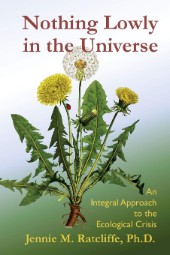Synopsis
The world is facing an existential crisis. Looming climate breakdown and ecological collapse could lead to the “sixth extinction” event in Earth’s history, this time by our own hand, and the massive loss of human life and of many other life-forms with which we share the earth. How did we get here, and how can we transform our ways of thinking and living to avoid catastrophe? And what really sustains us?
In a wide-ranging and comprehensive analysis based on decades of experience as an environmental research scientist, activist and Quaker Jennie M. Ratcliffe explores the interconnected scientific, technological, economic, religious, and psychological causes of our predicament and shows how the ecological crisis is, at its heart, a spiritual and moral crisis. Drawing primarily on Quaker testimonies, on Gandhian, Buddhist, and other wisdom traditions, and the work of Thomas Berry, Arne Naess, E.F. Schumacher, and others, Ratcliffe explores the underlying principles by which we – particularly those of us in the wealthiest countries – can radically transform our ways of life. The principles of integrity, reciprocity, nonviolence, simplicity, and equality, rooted in a realization of the unity and interdependence of – and love for – the whole earth community, are the foundation of an integral deep ecology, deep economy, and deep peace. Far from being utopian, they can and are being translated into spiritually-grounded practices around the world, offering transformational paths to the long-term sustainability of a more just and peaceable world for the commonwealth of life and the emergence of a new Ecozoic era.
Jennie was the Henry J. Cadbury Scholar at Pendle Hill in 2006, where she began working on Nothing Lowly in the Universe. She also wrote the August 2009 pamphlet, Integrity, Ecology, and Community: The Motion of Love (PHP #403).






